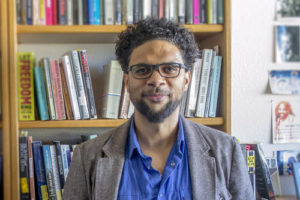Last week, I missed INTD 288. I missed class because I went to go see the keynote speaker for the Diversity Summit. In the end, I saw the lecture and it was a sharp reminder of how binary thinking is isolating.
In particular, the dialogue, put both Steve Prince’s concept of “process” and Dennis Childs’ concept of “progress” into question. In consideration to SUNY Geneseo, it begged the question: is Geneseo making progress on their “Community Commitment to Diversity, Equity, and Inclusion”? This transformative document is made to acknowledge, reward, and hold accountable Geneseo students, staff, faculty, and administrators on their commitment to diversity. The commitment came after and in response to David Sorbello, a professor of sociology who created a transphobic quiz that gained media attention.

As I stated before, Dennis Childs visited SUNY Geneseo at the Diversity Summit on March 1, 2019. The Diversity Summit is “a full day of diversity-focused sessions hosted by members of the campus community”. It is a day to see a number of dialogues surrounding topics like race or gender by faculty, staff and/or students. For example, I presented a dialogue on language and its relationship to power dynamics.
Dennis Childs was addressing the efforts of the campus community to increase diversity all while being critical of the institution. Childs explains that improvement has certainly been made since SUNY Geneseo’s foundation in 1871 but that it is “important to continue to cultivate an inclusive environment beyond merely reaching benchmarks.” He goes on to connect Geneseo’s microcosmic issues of racism and other forms of oppression, to his own book Slaves of the State: Black Incarceration from the Chain Gang to the Penitentiary. A book that, as written by the University of Minnesota, discusses how the incarceration of black people represents “ghostly” the perpetuation of chattel slavery. Dr. Childs would constantly refer to SUNY Geneseo and its mission all the while connecting the discussion to his own research. Excluding the uncomfortably cheesy video of students, staff, faculty, and administration reading the “Community Commitment to Diversity, Equity, and Inclusion” the keynote was amazing.
When I left I was stuck thinking about Childs’ reference to “progress” and Steve Prince’s reference to the “process”. I kept asking myself, what progress has Geneseo made? Has it at all changed since its foundation?
The simple answer is: yes, of course! Ysaÿe Maria Barnwell, an alumna who from 1967 is an example of that. As reported by the Lamron last year, “When Barnwell attended SUNY Geneseo in the 1960s, she was one of the eight African American students enrolled at the institution. Fortunately, the number has increased immensely with African-American students holding 3% of the racial demographics.
Ignoring my cynicism, it is important we acknowledge that simply accepting more people of color, cannot be perceived as progress but in fact part of the process to progress. In Du Bois’ The Souls of Black he reflects on the meaning of progress. While teaching at Fisk University, he comes to a schoolhouse early on. Du Bois writes, “The schoolhouse was a log hut, where Colonel Wheeler used to shelter his corn. It sat in a lot behind a rail fence and thorn bushes, near the sweetest of springs.” That is where Du Bois taught and educated some of the youth in that rural black community. Du Bois, after some time there leaves. When he returns the schoolhouse is different. Du Bois writes, “My log schoolhouse was gone. In its place stood Progress; and Progress, understand, is necessarily ugly.” This transformation is a very saddening one because it indicates that progress is a painful experience. The process of that progress is the cycle of poverty and racial oppression that hurt many families.
However, that is the harm of looking at Steve Prince’s “process” and Dennis Childs, “progress” as a binary. It disregards that these concepts are filled with more gray than simply black or white. Certainly, we must recognize the process of Jim Crow and how it deeply hurt people like Du Bois. At the same time, it brought Du Bois into contact with youth who on some level had to have benefited from his education and certainly from his literature. That is progress.
For Steve Prince, every character is in their own process in the Urban Mixtape. Some raise their hands, others drum, and some even look to be singing. All the while they are all progressing forward with characters moving and growing across a vast land. For Du Bois
Early on in the blog and in my previous blog post, I referenced loneliness. The reason is because of the binaries that exist at SUNY Geneseo. Simply my choice in having to decide between Beth McCoy’s class and Dennis Childs lecture was a binary that never needed to be created. In reality, I had millions of choices in what I could do with my time, not simply two choices. However, Geneseo and also my own psyche, conceptualize things into parallels that are unneeded.
At the end of the lecture, Dennis Childs called for us to restructure our frameworks. I can understand why Dennis Childs was arguing that. Our immediate framework puts everything into binary and all binaries are bound to leave someone or something out. To address the loneliness and strangeness that I feel at Geneseo, I will begin to analyze things in parallel with each other. In the case of my friend Michele-lane Detouche, she said this at Barnwell’s visit last year.
“The biggest parallel between Dr. Barnwell and I is that we both harness a consciousness on what it means to be black.’
By using parallels, I can better understand the loneliness and strangeness that Geneseo makes me feel.
